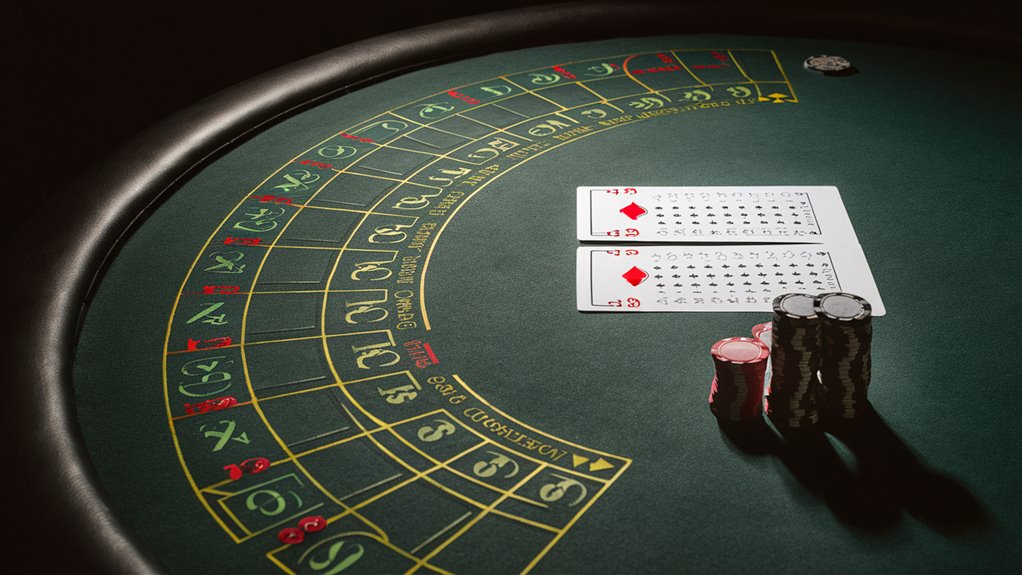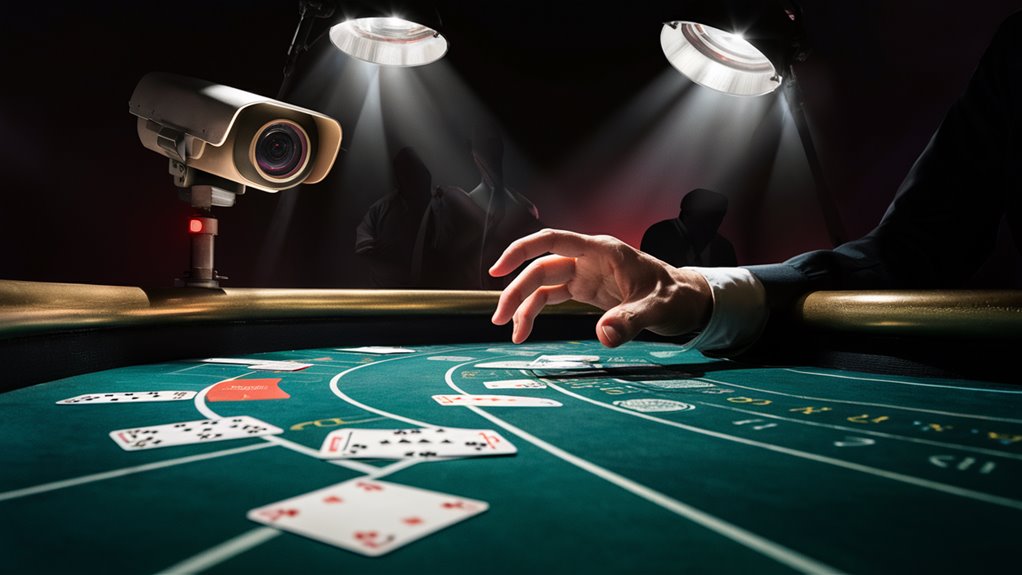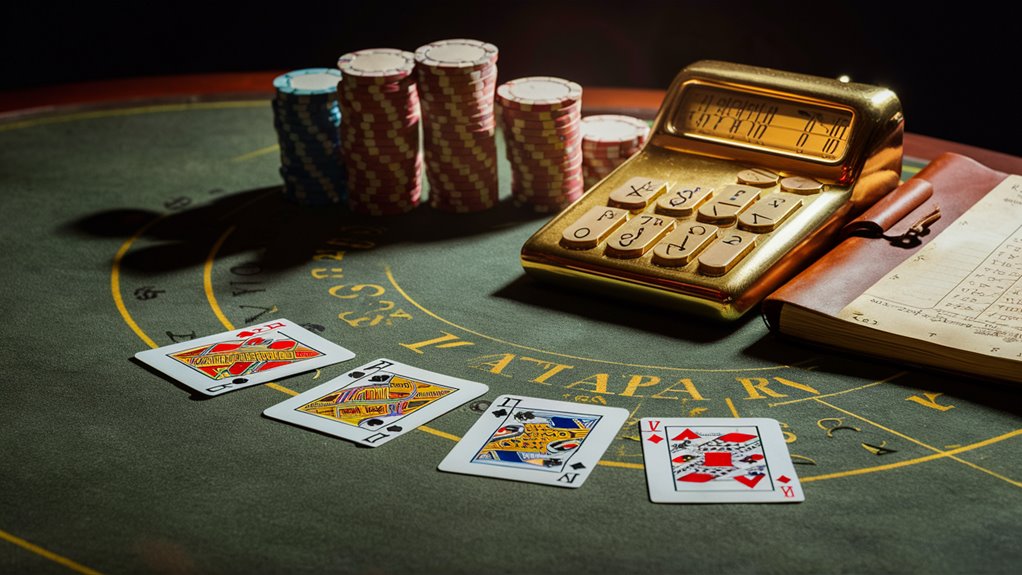Breaking Down Blackjack Myths with Math

How Player Choices and Chance Work
Each blackjack hand is its own game. This means what others do at your table doesn’t change your chances of winning at all. This key fact kills a big myth in gambling.
Simple Plans and the House Edge
The best plan to follow in blackjack is a simple, proven method. This strategy cuts the house edge to about 0.5%. This holds up no matter if you are having good or bad luck right now. It’s key for anyone serious about playing.
Counting Cards and Betting Plans
Counting cards in your head is okay almost everywhere, but many betting plans don’t hold up under math. Plans where you increase bets after you lose, like the Martingale, don’t work out because of math.
Understanding Hot and Cold Tables
The idea of hot or cold tables goes against math – cards don’t remember what was played. Each new hand starts fresh, all by the numbers.
Insurance Bets and the Math Edge
Insurance bets give the house a huge 7.4% edge. Facts show these bets help the casino more than the player long-term.
Making Smart Moves
Seeing the dealer’s first card helps players make smart moves. Knowing these facts turns a fun game into a smart, strategic one.
Quick Math Points
- Chance works alone in each hand
- Simple plans lessen the house edge
- Big betting leaps don’t beat the math
- Cards don’t hold past plays
- Insurance ups the house’s side
- The dealer’s open card is key in choices
Your Blackjack Success and Others
How Others at the Table Change Your Game
It’s a common false thought that other players change your chances to win at blackjack. Though some blame losses on how others play, math shows this isn’t true. Let’s see how other people’s picks don’t change your odds.
The Math Behind Cards
How cards come out doesn’t depend on people’s choices. Each deck has a fixed mix, and the odds don’t change as the game goes on. When folks talk about “stealing the dealer’s bust card” or making “wrong moves,” they’re just mixing up the order – not the number facts.
Evidence and Looking at Chances
Watching many games shows that one player hitting or standing doesn’t change the math for everyone else. Card order is random, so over a lot of games, what each person does doesn’t change the larger picture.
Stick to Winning Ways
The real things that change your win rate are:
- Your choices
- House rules
- Following the simple strategy
- Playing the best math moves
Winning at blackjack is all about sticking to math-tested methods rather than what others do. Keep to the basic plan, the smartest way based on your and the dealer’s cards.
Making the Most of Your Game
Remember these points:
- Change in card order doesn’t change the odds
- Long-term results follow the math
- How you play drives your success
- Other’s choices even out over time
The Fact on Simple Blackjack Plan: It Works
What’s Behind the Simple Blackjack Plan
The basic plan in blackjack is based on solid math for the best game over time. If you follow it right, it lowers the house edge to about 0.5%, making it the best consistent play in blackjack.
Expectations vs. Reality
While the simple plan tells you the best moves, it’s vital to know its limits. This strategy:
- Makes the most of expected value
- Cuts down the house edge
- Gives math-right choices
- Can’t promise wins every hand
Choosing Right by Numbers
Think of having 16 against a dealer’s 7. The simple plan says to hit, even though there’s a 62% chance of going over 21. This shows even smart math moves have risks, but they’re still your best bet for winning in the long run.
Keep to the Strategy
Players often drop the simple plan after some losses, thinking the strategy didn’t work. This is a big mix-up about chance and value. The plan does what it’s supposed to by:
- Choosing wisely each time
- Keeping a steady math edge
- Lowering losses over many games
- Giving you better chances when things look good
Long-run wins in blackjack need you to stick to the basic plan, whatever happens short-term. The math behind these choices stays the same, even when it looks different for a bit.
Is Counting Cards Wrong? The Legal Facts

What’s Okay with Counting Cards
Counting cards is totally legal in the U.S., even though many think not. Players using their minds to track cards are just using their smarts with what they see at the casino and How They Ensure Fair Play
Legal vs. Not Okay Ways to Count
Using help like gadgets to count is not allowed. This includes:
- Phones or computers
- Devices that count for you
- Tools from outside
- Systems that track electronically
What Casinos Can Do
Even though counting in your head is okay, casinos have a lot of power because they are private places:
- They can stop serving you
- They can ban counters
- They can start counter moves
- They can change game rules
What Courts Say
Courts have said:
- Thinking it through is legal
- Using your brain isn’t a crime
- Simple strategy and counting are okay
- No law stops skilled play
Hard Parts of Pro Counting
Top-level counters face tough stuff even if it’s legal:
- More shuffles by the dealer
- Changed how deep they deal in the deck
- More watching
- Possibly getting kicked out
- Limits on how much you can bet
Counting Right
Legal counting needs you to:
- Only count in your head
- 더 많은 정보 보기
- Stay away from gadgets
- Follow house rules
- Know what casinos can do
- Accept the rules in the place
Real Talk on Blackjack Insurance: Smart or a Math Trap?
About Blackjack Insurance
Insurance in blackjack is an extra bet you can make when the dealer has an ace, and it pays 2:1 if the dealer gets a blackjack. Though it may seem like a good safety net, you need to think about the numbers to see if it’s really worth it.
The Numbers on Insurance Bets
In a typical six-deck game, out of 312 cards, only 96 are tens or faces (valued at 10). This means there’s about a 30.8% chance of the dealer having a blackjack when they show an ace. For insurance to be a good bet, the dealer would have to have blackjack more than 33.3% of the time, which doesn’t happen, putting you at a disadvantage.
House Edge and What to Expect
The house edge for insurance bets is about 7.4%, making it a less good choice in blackjack. This means you’re likely to lose $7.40 for every $100 you bet on insurance over time, which hits your chances to win money.
Counting and Insurance
Counting cards well is the only time when taking insurance might make sense math-wise. When there are more high-value cards left, your chances get better. But for people just playing the simple strategy, insurance usually isn’t a smart bet.
Smart Betting Tips
Smart players should skip insurance most of the time and just stick to the ideal simple strategy for their plays. The facts show clearly that insurance tends to cut into your expected value over time, making it not the best choice for those wanting the best returns.
Getting What Hot and Cold Tables Mean in Blackjack
Numbers Behind Table Streaks
Chance rules every hand of blackjack, making the idea of “hot” and “cold” tables just wrong thinking among players. Many players think they can tell when a table is giving out good or bad cards, but this goes against simple math rules about single events.
Each Hand Stands Alone
Every hand in blackjack is its own thing, aside from one big point: the deck changes as cards come out. This is like flipping a coin where five heads in a row doesn’t change the 50% shot of the next flip being heads. The same math truth is there for blackjack hands.
Truth on Streaks
What looks like hot or cold runs are just random groups – these naturally show up in any random-based series. Looking at the stats, you’ll see these patterns in 100 random events, but they don’t tell us anything real about what will happen next.
Since the deck doesn’t remember past hands, using what you think the table is like to decide bets can make you lose big.
Only Real Tracking Method
The only math-backed way to tell if a deck is in your favor is card counting. Unlike guessing if a table is hot or cold, counting looks at what cards are still to be played to see if you have a real edge. Depending on just feeling if a table is lucky or not can push you into bad bets based on what you want to see, not the real numbers.
